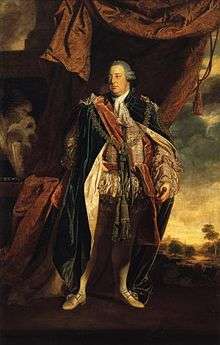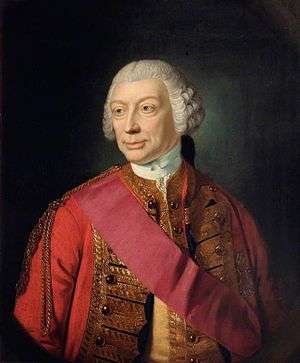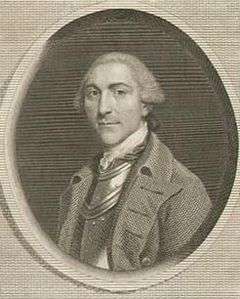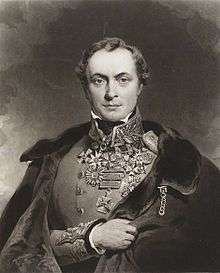Commander-in-Chief of the Forces
The Commander-in-Chief of the Forces, or just the Commander-in-Chief (C-in-C), was the professional head of the English Army from 1660 to 1707 (the English Army, founded in 1660, was succeeded in 1707 by the new British Army, incorporating existing Scottish regiments) and of the British Army from 1707 until 1904 (the office was replaced in 1904 by the Chief of the General Staff.)
From the passing of the War Office Act 1870, as part of the Cardwell reforms, the C-in-C was made subordinate to the Secretary of State for War.
In most instances, Commanders-in-Chief of the Forces were not cabinet members. Instead, the British Army was represented variously in government by the Paymaster of the Forces (Paymaster-General), Master-General of the Ordnance, Secretary at War, Secretary of State for War and the Colonies, Secretary of State for War, and from 1964, together with the other services, by the Secretary of State for Defence.
Officeholders
General-in-Chief Command (1660–1793)
| Rank | Name | Image | In office | Reference |
|---|---|---|---|---|
| General | George Monck, 1st Duke of Albemarle |  |
3 August 1660 – 3 January 1670 | [1] |
| Vacant | 3 January 1670 – 30 March 1674 | |||
| General | James Scott, 1st Duke of Monmouth |  |
30 March 1674 – 1 December 1679 | [2] |
| Vacant | 1 December 1679 – 3 June 1690 | |||
| General | John Churchill, 1st Earl of Marlborough | .jpg) |
3 June 1690 – 30 April 1691 | [3] |
| General | Meinhardt Schomberg, 3rd Duke of Schomberg |
 |
30 April 1691 – 1691 | [4] |
| Vacant | 1691 – 24 April 1702 | |||
| General | John Churchill, 1st Earl of Marlborough | .jpg) |
24 April 1702 – 1708 | [3] |
| Vacant | 1708 – 1 January 1711 | |||
| General | James Butler, 2nd Duke of Ormonde |  |
1 January 1711 – 1714 | [5] |
| Vacant | 1714 – 1 January 1744 | |||
| Field Marshal | John Dalrymple, 2nd Earl of Stair | _General_and_Diplomat.jpg) |
1 January 1744 – 1744 | [6] |
| Field Marshal | George Wade |  |
1744 – 1745 | [7] |
| Vacant | 1745 – 1745 | |||
| General | Prince William, Duke of Cumberland |  |
1745 – 24 October 1757 | [8] |
| Field Marshal | John Ligonier, 1st Earl Ligonier |  |
24 October 1757 – 1759 | [9] |
| Vacant | 1759 – 13 August 1766 | |||
| General | John Manners, Marquess of Granby | 13 August 1766 – 1769 | [10] | |
| Vacant | 1769 – 19 March 1778 | |||
| Field Marshal | Jeffery Amherst, 1st Baron Amherst |  |
19 March 1778 – 29 March 1782 | [11] |
| Field Marshal | Henry Seymour Conway |  |
29 March 1782 – 21 January 1793 | [12] |
Commander-in-Chief (1793–1904)
| Rank | Name | Image | In office | Reference |
|---|---|---|---|---|
| Field Marshal | Jeffery Amherst, 1st Lord Amherst |  |
1793 – 1795 | [13] |
| Field Marshal | Prince Frederick, Duke of York |  |
1795 – 1809 | [14] |
| General | Sir David Dundas | 1809 – 1811 | [15] | |
| Field Marshal | Prince Frederick, Duke of York |  |
29 May 1811 – 22 January 1827 | [16] |
| Field Marshal | Arthur Wellesley, 1st Duke of Wellington |  |
22 January 1827 – 22 January 1828 | [17] |
| General | Rowland Hill, 1st Lord Hill | .jpg) |
22 January 1828 – 15 August 1842 | [18] |
| Field Marshal | Arthur Wellesley, 1st Duke of Wellington |  |
15 August 1842 – 14 September 1852 | [19] |
| Field Marshal | Henry Hardinge, 1st Viscount Hardinge |  |
28 September 1852 – 5 July 1856 | [20] |
| Field Marshal | Prince George, Duke of Cambridge |  |
5 July 1856 – 1 November 1895 | [21] |
| Field Marshal | Garnet Wolseley, 1st Viscount Wolseley |  |
1 November 1895 – 3 January 1901 | [22] |
| Field Marshal | Frederick Roberts, 1st Earl Roberts |  |
3 January 1901 – 12 February 1904 | [23] |
References
- ↑ "George Monk". Oxford Dictionary of National Biography. Retrieved 21 January 2014.
- ↑ "James Scott, 1st Duke of Monmouth". Oxford Dictionary of National Biography. Retrieved 21 January 2014.
- 1 2 "John Churchill, 1st Duke of Marlborough". Oxford Dictionary of National Biography. Retrieved 21 January 2014.
- ↑ "Meinhardt Schomberg, 3rd Duke of Schomberg". Oxford Dictionary of National Biography. Retrieved 21 January 2014.
- ↑ The London Gazette: no. 4948. p. 1. 3 January 1711. Retrieved 21 January 2014.
- ↑ "John Dalrymple, 2nd Earl of Stair". Oxford Dictionary of National Biography. Retrieved 21 January 2014.
- ↑ Heathcote, p. 286
- ↑ "Prince William, Duke of Cumberland". Oxford Dictionary of National Biography. Retrieved 21 January 2014.
- ↑ Heathcote, p. 203
- ↑ "John Manners, Marquess of Granby". Oxford Dictionary of National Biography. Retrieved 21 January 2014.
- ↑ Heathcote, p.25
- ↑ Heathcote, p.94
- ↑ "Jeffery Amherst, 1st Baron Amherst". Oxford Dictionary of National Biography. Retrieved 21 January 2014.
- ↑ Glover, (1973), p.128
- ↑ "Sir David Dundas". Oxford Dictionary of National Biography. Retrieved 21 January 2014.
- ↑ The London Gazette: no. 16487. p. 940. 21 May 1811. Retrieved 21 January 2014.
- ↑ The London Gazette: no. 18327. p. 153. 23 January 1827. Retrieved 21 January 2014.
- ↑ "Rowland Hill". Oxford Dictionary of National Biography. Retrieved 21 January 2014.
- ↑ The London Gazette: no. 20130. p. 2217. 16 August 1842. Retrieved 21 January 2014.
- ↑ The London Gazette: no. 21362. p. 2573. 28 September 1852. Retrieved 21 January 2014.
- ↑ Heathcote, p. 142
- ↑ The London Gazette: no. 26676. p. 5923. 1 November 1895. Retrieved 21 January 2014.
- ↑ The London Gazette: no. 27263. p. 83. 4 January 1901. Retrieved 21 January 2014.
Sources
- Glover, Richard (1963). Peninsular Preparation: The Reform of the British Army 1795–1809. Cambridge University Press.
- Heathcote, Tony (1999). The British Field Marshals 1736–1997. Pen & Sword Books Ltd. ISBN 0-85052-696-5.